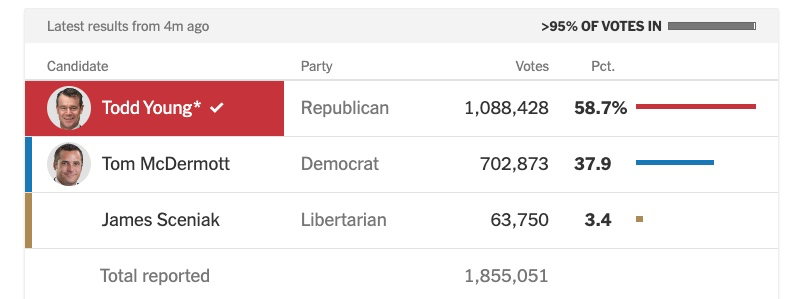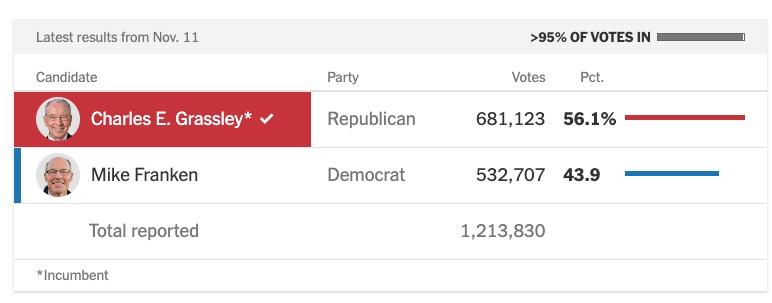Out of curiosity, I decided to take a look at how some of the long shot Senate races which there had been some minor buzz about ended up going.
In Missouri, there was hope that a beer fortune heiress billionaire might be competitive. She wasn't.
In Missouri, there was hope that a beer fortune heiress billionaire might be competitive. She wasn't.

In Indiana, there were a couple of polls showing Tom McDermott might be competitive. He wasn't.
(again, this isn't a reflection on the candidates themselves, just about the state they ran in).
(again, this isn't a reflection on the candidates themselves, just about the state they ran in).

In Louisiana, there was some controversy on the Democratic side about whether to back a "safer" moderate candidate (Mixon) or one more to the left on issues (Chambers). It didn't matter--Kennedy ended up getting nearly twice as many votes as both of them *combined*. 

In Oklahoma, *both* GOP Senate seats were up this year, with two women w/the same last name (no relation) running as Democrats. There was some buzz that Kendra Horn, at least, might pull off a massive upset. Didn't happen. :( 

And finally, in Utah, Democrats decided to take a gamble on Evan McMullin to see if combining forces with independents & #NeverTrumpers might be a way to win in a deep red state. Sadly, it didn't work. 

I'm not being snarky here--I raised money for all of these candidates (except for LA, where I just raised money for the state Democratic party instead), and I'm disappointed none of them managed to pull it off. I give huge props to Dems who stick their necks out in red states.
Oh yeah...there were also 2 long shot Governors races where the Dem candidate was either leading or competitive in several polls towards the end of the election cycle, in Oklahoma and South Dakota. Neither one ended up even close, I'm afraid :( 



And finally, there's this year's "Amy McGrath" case study: Georgia's 14th House district, where Dems poured something like $15 million into a race where MTG ended up still crushing him nearly 2:1. 

Again, not belittling Flowers for running *or* Dems for donating a few bucks to him--after all, Adam Fritsch *may* still end up pulling off a win against Boebert in CO-03. But there are limits, & there's a difference between an R+7 district (Boebert) & an R+22 district (MTG).
I almost forgot Iowa, which *I* was really hoping would be a sleeper upset. Franken had a mini-surge...which then faded out again at the end. Sigh. 

As for my own fundraising, here's how it broke out for the Senate races. Notice how I didn't ignore *any* of the the long shot states but I did get more realistic towards the end of the campaign cycle. 

• • •
Missing some Tweet in this thread? You can try to
force a refresh








